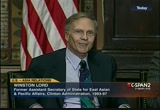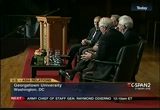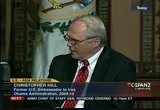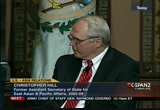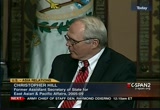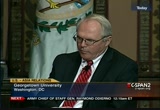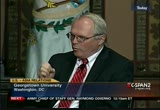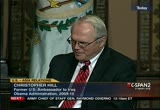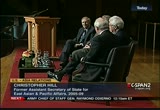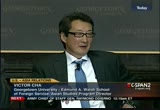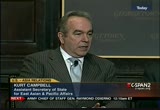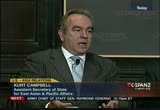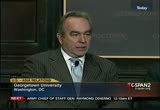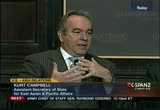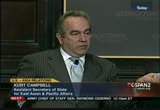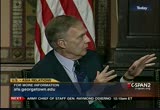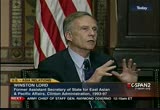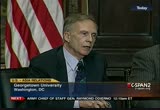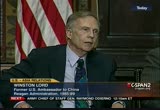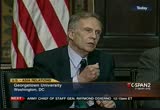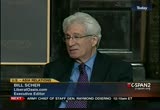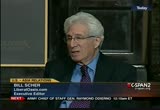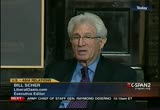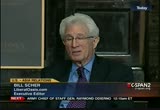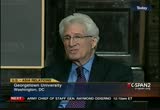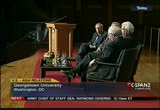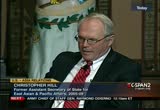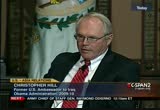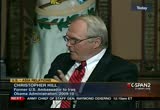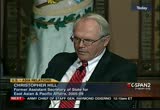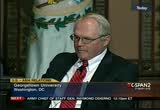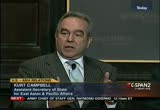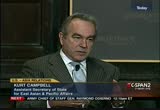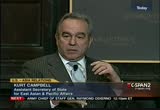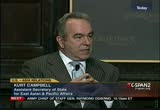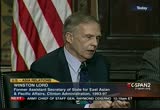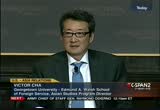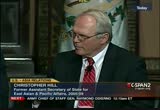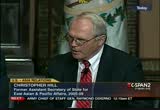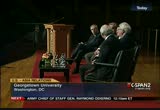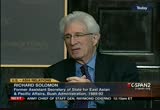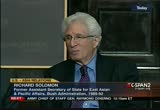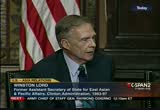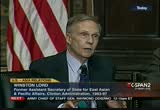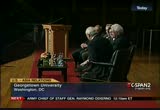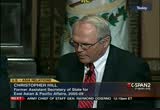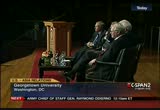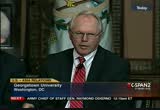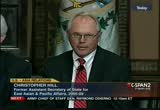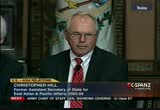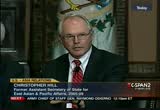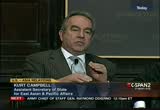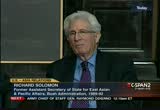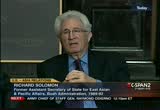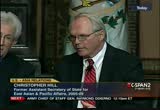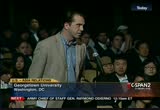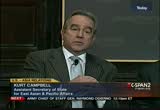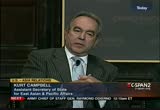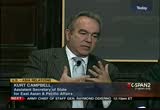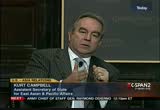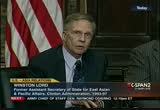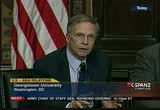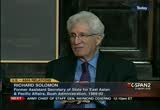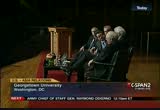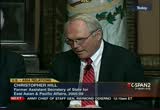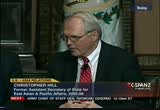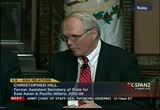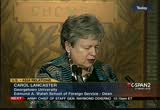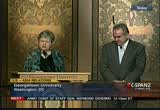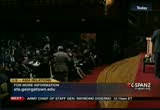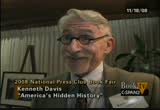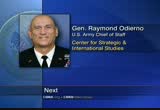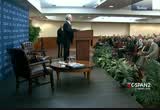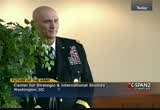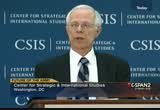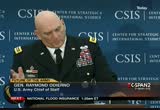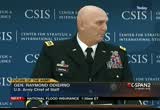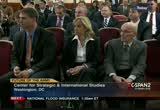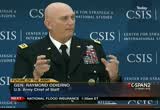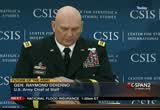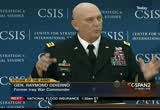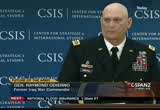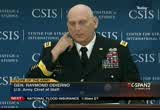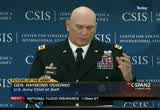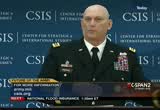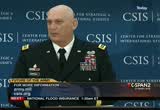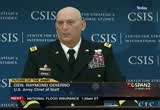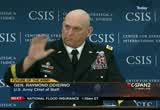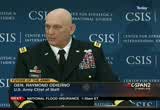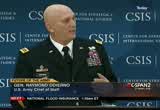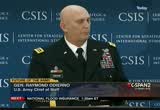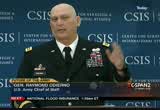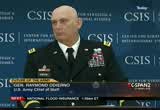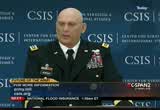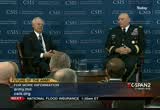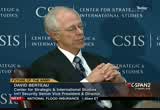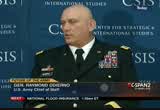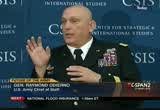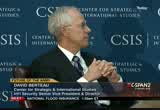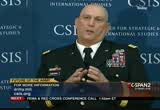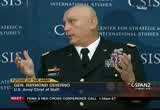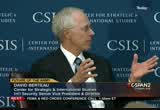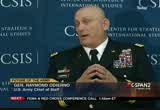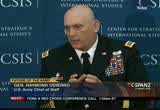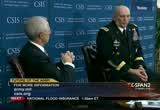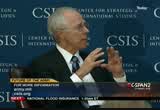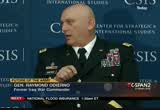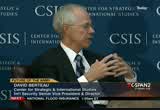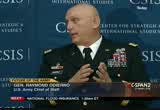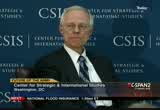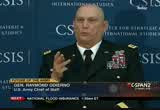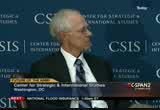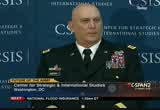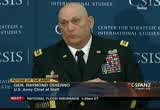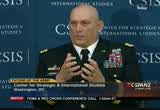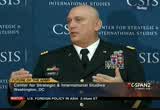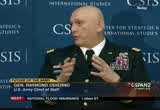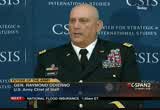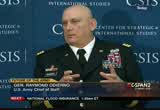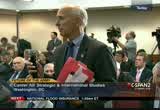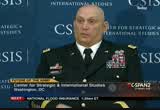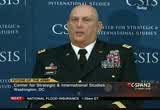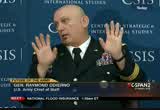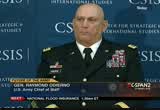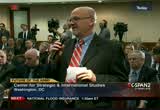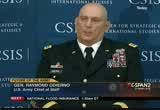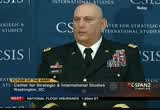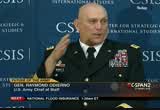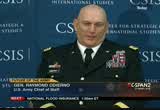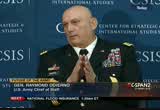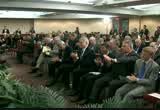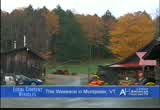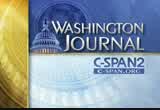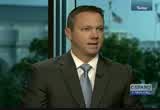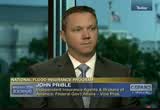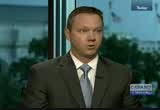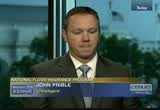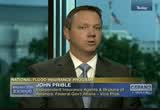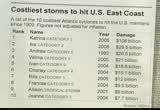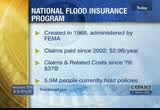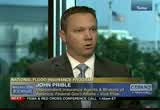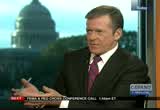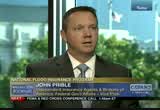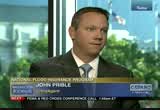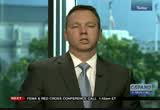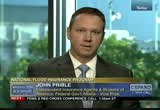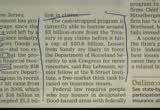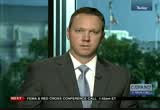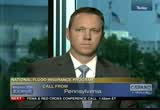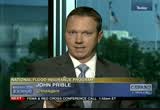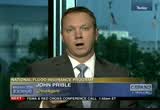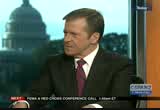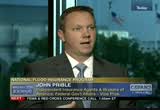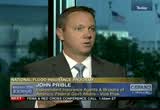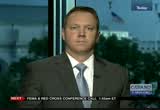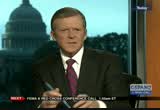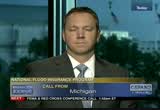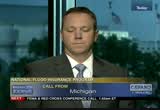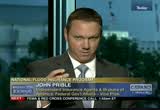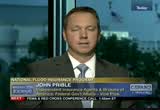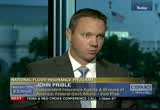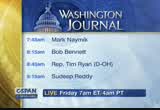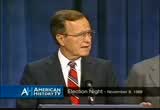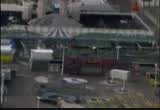tv Capital News Today CSPAN November 1, 2012 11:00pm-2:00am EDT
11:00 pm
two in state to rumor that i was going to be fired. that's the way when you're in government. i'm happy to say to cut it short for the series of crisis early in the administration with the chinese, not only this one, but the visit to the taiwan president and the way taiwan missile crisis we ended up in the following year successfully got the relationship back on track, set up a series of summits between our presidents. so it all ended well. it does underline the pendulum swing you feel in policy terms and in personal career terms. >> thank you. ambassador hill, also, thank you for joining us. coming from denver despite the logistic difficult created by hurricane sandy. the biggest challenge. >> there was no challenge coming in from denver 68 and sunny. [laughter] it's been like that for the last couple of weeks. i don't know what the fuss is. [laughter] no, let me say what a pleasure
11:01 pm
it is to back hire and thank you so much for putting this together. as i'm looking out in the audience here, i see a lot of people i worked with during the days, and, you know, as we talk about the sort of onerous and times odious job of assistant secretary, one thing that made it a lot of better, you had extremely talented people to work with, and those are people that made the job easier and in fact made the job enjoyable at times. the other thing that makes the job easier is that i think our president has secretary of state have taken the position very seriously and put good anemia it. when you become the assistant secretary chances are pretty good that you're you have a good predecessor there. i had jim kelly who had done a lot of work to set things up. and to get through a very tough
11:02 pm
time, and the other thing is as in the state department, you're not working alone. you are working with the national security counsel staff. i have talented people, mike green here in the audience worked with him until he was replaced by dennis wild. i was i felt we were ease coned in a good team. as for the challenges, i worked in the job in the second bush administration, and basically the challenge i think is always the amount of bandwidth in washington. if you take issues for being important and being urgent, it seems that the u gent always beats out the important. so maybe dating back to a few years before when ambassador lord had the position, i think everyone understand east asia definitely important. but i was getting constantly trump bid the fact that, you
11:03 pm
know, we had a double header going in afghanistan and iraq, and quite understandably we had president who will be to be immersed in the issues. and often and one of the challenges was that often when they look to another part of the world like east asia, it was in terms behalf those countries in east asia mean to the central challenge which was waging the war on terrorism or dealing with the wars. and yet, you know, if you go to a country like indonesia, you know, this is a country that you put on a map, it goes from california to bermuda. it is huge. enormous population. and to reduce indonesia only to a bit player and be a role issue on the global war on terrorism department sit too well in indonesia. so i think part of the challenge was to really work with these countries in of themselves and not just as instrument of something that was going on in
11:04 pm
another part of the world. i came to the job by being ambassador in korea, and i walked in to a meeting that i thought was going to be with steve hadly and condoleezza rise joined the meeting. both steve and condoleezza said to me our country has been going through two wars and we need diplomats. they made it clear we need to start tamping down some issues in the world. we can't have everything kind of belowing up in the our faces. and one of the issues that i was very aware of coming from seoul was that if you did opinion survey in the fall of 2004, some 40% of south korea begans were blaming the united states for the north korea nuclear crisis, if you could imagine that. so a lot of what was really
11:05 pm
necessary in terms of the six-party talk, the process the president bush had set up with [inaudible] process that jim kelly and mike green got going. it in fact it elaborated some of the negotiating strategy. that process was very important not so much in terms of dealing with the always lovable north koreans. you pick to pick them up and hug them, you know. the process was important we had allies that were doubting us. and i think the thing that we did in terms of working with the rok and closing that daylight that it appears between our two countries, and really creating a situation where we could work with the rok on lot of things with i think it was a very important aspect of what we ask. another thing, it goes back to something that dick solomon
11:06 pm
mentioned. we do best with china when we're doing real stuff with china, and the real stuff that we did with china on cambodia, we were having trouble finding stuff to do with china especially in the wake of the issues that merged with china. and to be sure, we set up the working groups. my goodness, i think we had 365 dialogues with china across every subject. we weren't finding real things we could sit down and say, okay we'll do this if you do this that. and do kind of a real address real problems. i think the sixth-parties were also important pause of the pattern of cooperation and interaction we established with the chinese. you know, when i look at the sort of i guess we'll get in to this when further discussions. when i look at where we're going go in the future, we have to
11:07 pm
figure out that relationship with china, and hen somewhere between g-2 and china as the ever lasting enemy with which we're bound to conflict. the overreading of the wars. by the way, i'm from denver no one reads -- [inaudible] in denver. it's only happening in think tanks in washington. i do not know why, but i guess we can kind of put aside the notion of the inevitable conflict, and rather place it with a notion of relationship as indeed too big to fail. we need figure things out. when i think back, it was an issue of competing with the important competing with the urgent, of trying to open up some new areas, for example, i found out that i was the first assistant secretary since thrord go to new zealand. and now kurt, i think you go every day or something. [laughter] you go fishing there, you do
11:08 pm
everything with the new zealanders. you know, that should have been, you know, low hanging fruit yet i think you needed an extension ladder to get going with new zealand. i'm proud we did. that's a country you shouldn't take any country for granted especially when you have the problems that we had all the crazy things out in solomon islands and other things like that. who is going to mind that. >> the [inaudible] >> not this solomon island. but other solomon islands. i think you need countries you need work with. we found that we had some allies. anyway, thank you for putting this together. i look forward to a discussion. >> great. thank great. why don't we -- all of you in your comments did mention china. why don't we go cricketly to the question of china. and i guess when we teach or when i teach international relations here in at georgetown after we read the book about the war, one of the things i tell
11:09 pm
the students is that the most important unanswered question in international relations steady how the international system deals with the rise much china. it will affect the way we study ir in next generation. how well do you think the united states has cancel with the rise of china over the years, and what have you learned from each other from past experiences about daling with china? kurt, why don't we start with you. >> thanks, victor. it's a great question, a hard question. already our colleagues have touched on elements it. i'll give you my take. i believe it will be the most consequence issue foreign pots we will face. much more difficult than any relationship we had in the proceeding years. largely because of the complexity. largely because it em compasses every element of state craft, of
11:10 pm
economic intercourse of people to people to diplomacy and indeed hard core trait strategy. it will be vexing and challenging. it does not do us a service, i agree with chris in this respect, that much of our strategic parameters are dominated by fifty years of the cold war, and some of those frameworks like an echo animate certain aspects of how we think about asia today. and hear constant refrains about whether the united states is trying to contain china. sort of the latter day of soviet union. without the recognition that the number one goal of every country in asia is to improve the relationship with china. , if any, you believe that, as i do and i experience it on a daily basis to think about constricting a strategy that did not reflect that fundamental
11:11 pm
truth seems nonsensical. i think the challenge is going to be enormous. my one recommendation would be there are a lot of ways that people think about asia. there are some that say that look at the core of the strategy like a pin wheel has to be china and that you basically engage directly with beijing and thins flow from the relationship. others would say, look, the key to managing hard issues is maintaining strong alliance and partnership with the key countries like japan and south korea and australia. there be others that would say, look, there are other ways to think about transnational challenges that unit all the countries in asia together as we deal with things like climate change. my only recommendation and actually, my hope for whoever comes who follow in our footsteps is that there is a deep recognition that good china
11:12 pm
policy is best done when it is embedded in an asian strategy. and that good china policy doesn't mean just going to beijing. it works in the neighborhood, working to ensure that other countries are with you in dialogue and discussions on issues of mutual concern, much better shot of getting the kind of relationships and agreements very much agree with what chris say. it was a heyday in cooperation with china during the six-party talk. part of them was working within the context constellation states. that's going to be essential. but the truth is, it is sometimes the case that when those of our generation sit down and talk with those that were at the creation, the architect of the u.s. china relationship. it is sometimes, at least my sense, is there is a little bit
11:13 pm
of scolding about gosh, we did it this way forty years ago. so you sort of lost the hang of it. i would simply say the strategy that you adopt when you are trying to lure zen phobic general inward looking undergopped nation out in to the world are incredibly difficult, different from the strategies that you apply when you're dealing with the country that is rising faster than any country in history. with a very strong sense of itself, strong sense of nationalism, and how you engage and shape their global choices. and so i think it will be the dominant feature of american foreign policy going forward. i believe we will have a welcoming asia that wants a stronger engaged america. that's the biggest difference from my tenure to the tenure of the gentlemen.
11:14 pm
in the past, there was often some -- [inaudible] about the united states. no longer. everyone in asia wants more of the united states. and our job will be to see if we have the wisdom to sustain a very high level. operating engagement that involves not just china, which will be at the center of much what we do, but also the other nations asia, japan, south korea, all of that it's a critical component of our engagement strategy. it australia, new zealand as chris indicated and a rising india. >> can i jump in here. >> you mention the architect forty years ago. work with -- [inaudible] put me in the group because i grow with exactly with the approach you just outlined. and it's rebounding to asia the administration done i think very successfully there were three
11:15 pm
myths and it relates to what you were talking about. one knit started in 2011, another myth it's essentially military and all of those against china. [inaudible] i'm sure kurt would agree. the reasons he just mentioned. it started in twiep and was because asia important generally not just china india and korea and japan and southeast asia whatever you want to talk about and the economy. and it is designed to welcome china and the pacific to contain china. they are difficult to deal with. lets place this relationship briefly in historical perspective. we had four or five decades since i was first on the secret trip. as you know ahead of -- when we went in. and we a certainly a con sect yule relationship with china. we didn't have diplomatic religion. no concrete exchange. mostly balancing the soviet union during the cold war and talking in strategic terms about
11:16 pm
global affairs. in the '90s we began to pick up concrete exchanges and i was fortunate in to be china and increase trade and sellings arms to china cooperating in afghanistan and along the soviet border. but then along came [inaudible] so in the '90s the relationship had to adjust to two new dramatic element. the glue that held us together in the '70s and '80s. it was gone. the cold war was over. in a healthy way, e with had to greatly expand our relationship with china. but at the same time because of [inaudible] the human right issue got more prominent, and it was much more difficult to deal with china in terms of domestic politic. the '90s was a matter of dick and myself trying to struggle to how we can get the relationship on a broader basis and increase the exchanges.
11:17 pm
by the time we get to 2000 china is becoming a major power in the world and our interactions become in chris' and your turn much more extension and healthy and in some respect more reasons for friction in other respect. i won't get in to specific policy, i agree -- i think we all agree it's going to be a mixed relationship excuse it thing a give it will be sweet and sour. it's going tb a mix of -- [laughter] cooperation, competition, and contention. i think it's important to keep in mind that there's a floor and a ceiling on the relationship. so we don't succumb when we think things are going welcome play -- or gloom when we think things are getting tense. the -- we don't have disputes unless you count taiwan issue.
11:18 pm
china is not an imperial power like soviet union, japan, and -- consume the other domestic scene it can be aggressive. we have seen it in recent years. we have many problems we can work on together and can work on together. we have extensive economic reaction. it would be dangerous to get in a conflict and a aways of resource. the relationship is not going to become as far as i can see, one of hostility. on the other hand, there's a ceiling. above all, a different value systems are different political systems and conflicting interest and attentions are rising and establish. keep in mind it's going have the mix, you have 0 [inaudible] cooperation strategic dialogue and the committee that are set up for various level pling you can talk to each other and the
11:19 pm
chinese can tell us they want us stay in the pacific. we tell them we're not containing them, your not going get trust based on rhetoric. it's going to be have to be working on stuff in concrete areas you work on issues both regional and global and bilateral which build up constituency in the relationship which help to solve some of the problem and put in context for our public perspective publics the fact that question, we have human rights taiwan, trade -- [inaudible]
11:20 pm
it's not as good as it looks. >> thank you. richard? >> let me pick up on secretary campbell's point about the china today is just a more complex entity to deal with, and the great challenge that we face and they face is managing this relationship, and in this context, i want to stress what i see as two of the major areas of challenge. first is the internal
11:21 pm
challenge. we tend assume that china was growing at 10% a year for three decade, it slowed down a little bit, it's going keep growing. i think that's wrong. i think we're going to see a situation where for combination of economic and internal political reasons, china is now entering my guess is, a very difficult period. one way to put it is that the society has outgrown the political system that brought the revolution and seen the society grow in the way it has no substantial measure because of its economic growth. and i like to do this when i give talks about china. it's one of the most revolutionary technologies of any time, cell phone. why is it relevant in there are supposedly 400 million cell phones in china. we're dealing with a mobilized
11:22 pm
population. they know what's going on. they know what is happening in their vote and the world. and from my discussions with senior officials in the country, they're feeling enormous public pressure. think of the impact on politics of the scandal. of seeing [inaudible] the son out cavorting abroad with various party girls, there's been several other high level scandal in the leadership that reinforced what i believe is a growing alienation of the society from the party leadership. and as the country enters its fifth generation leadership, which is about to proceed in a form away shortly after the election and play out early next year, this leadership really does face some very fundamental
11:23 pm
issues can they open up the political process and dealing with the very substantial measure of distrust in the population. so that situation will be exacerbated if economic growth slows, people will be put out of work, or pesants coming in to the eastern provinces looking for higher incomes will be disappointed. i think the perspective of some significant instability are going to be part of the game. now what about external relations? the effort to create a greater, which we say strategic equilibrium through the rebalancing process is a risky one. it's risky because the chinese are viewing what we're up to not as an effort to maintain stabilityd in the region, to
11:24 pm
maintain the kind of working relations that have preventedded all of the historical animosity that recently surfaced with japan and with other countries to keep them under control. as we know from very interesting study that ken put out, high level of distrust on both sides. so the danger is that the effort to create strategic equilibrium will lead to polarization, in fact. that's one of the great challenges of imagining the relationship to see that it does not go in a negative distribution. and finally to put the china relationship in a broader context, the ability to shift those resources to east asia, i'm not sure is going to happen. because even though the administration is trying to disengage from the very heavy military engagements in iraq,
11:25 pm
afghanistan, that part of the world think about a situation where the loon goes up with iran and we're in a fight over the nuclear proliferation problem there. think about a situation where afghanistan really goes sour, or iraq does not go in the distribution we're hoping for. we may find it much more difficult to disengage from middle east, south asia, those kinds of issues that we're trying to unburden ourselves to be able to put more emphasis on this important east asia relationship. but i'm not sure it's going play out that way. mr. negative here, i think we have to look realistically at the cost both in terms of possible development in china and international affairs. >> thanks. >> i agree with a lot of what
11:26 pm
assistant secretary solomon just say. first of all, i think the issues in china are driven by domestic issues in china. i think we need to be a little careful about the sort of -- [inaudible] of ours and it's about us. it's not about us. there are things going on in china that have nothing do with it. where it does become something it do with us how do we treat chinese through these issues. how do we manage the relationship when they're clearly have the convulsion internally. the issue [inaudible] this is about corrupt party official in the way moby dick is a story there's a little more going on there. we need try to understand it. [laughter] a lot better than we do certainly a lot better than some of our media tries. so i think it is getting dice
11:27 pm
sei though, is in dick solomon suggests that the sort of social compact is beginning to fall apart there. growth is not going to be present in china. what is this doing to the aspirations of the society that has clearly, clearly outgrown the economic process? especially when the economic process isn't doing what it was supposed to or clearly, i'm sorry clearly outgrown the political sort of -- sort of security state that manages all of this and when the political security state doesn't manage the economy, i think that is greating enormous social tension. not every one of those social tensions has to do with chinese demanding more human rights. of course, that is going on. but what is also going on in a ominous way is a public that is
11:28 pm
becoming increasingly nationalistic. where they look to the government as why haven't you secured the raw materials that you say you're securing? and i think some of the recent belligerences which is a strong word, some of the neighbors as a result of this internal churn that is going on in china. we need watch that very carefully. it is not in our interest to make countries that have benefited tremendously from chinese's growth. if you look at growth rates throughout southeast asia. they are tied to the growth rate of china. so it is not in our interest to make these countries choose between us and china. it is in our interest to be very much present, and so i guess when we switch from the word pivot to rebalance or rebalance is that good . >> [inaudible conversations] [laughter] it's a good thing because we
11:29 pm
need to be -- we need to be there and we need to be supportive. but we need to be very careful not to be seen as somehow egging the situation on. somehow sharpen for the country and somehow becoming an element in the debate within china. finally, i'd like to say as someone who spent a lot of time in the other places in the world, richard, you're right, we're not going to be disengaged from the middle east or south asia. far from it. we're going to be very engaged. i hope it will be an engagement of a diplomatic kind. we won't have a trillion dollars going in to iraq again. because if that's what we're looking at, we cannot manage all of these issues simultaneously. i think we can be engaged in these other countries and still keep in mind the fact china is
11:30 pm
-- china and the rest of the east athey, israeli is quite essential to our interests. so i think certainly our country has its work cut out for it. but, you know, for those people that think somehow the u.s. is in decline and china is in the rise or india, or something, have a look at what those countries like china what the problems they have every day and ask yourself whether you'd like to exchange in boxes. ..
11:31 pm
looking off the table type demographics, where japan's, which is now gone from 120 billion people. and our children's lifetime of the can and 70 million people, something like that. japan pursuing nuclear energy because of last year's catastrophe and looking at these huge increases in lng and things like that. and then you look at the united states. you know, we are going to be a very big player for years to be calming for a lot of reasons, especially her economy. i think it is a good time to look at this because we are not in any kind of declining. we're going to be even more important in the coming four years. >> can i just respond to one
11:32 pm
thing i was thinking about to enter laster talked about, whether we should be optimistic about whether this can be sustained. i actually think the challenges are even greater that richard laid out, but i'm not sick will be able to deal with it. in terms of commitments, we are going to have a double pull. the one is going to be the continued need to be engaged in the middle east and south asia and i agree with that. but if you look at the history of modern american military engagements, what was generally done after periods of intense martial engagement is come home. korean war, vietnam, out world war, first world war. and so, we have two things we have to resist against the one his temptation to be drawn back in and the others to resist a desire to focus more on domestic
11:33 pm
affairs. there is also an enormous challenges on the personnel front. one of the things i am struck by his 15 years of war and a focus on the middle east will be sure to the matter core, your intelligence career specialists, military to focus a lot on those areas. so our government, not just the political appointees, but are heavily skewed numbers as challenges were going to have to create a whole new generation of people likely to the 1950s and 60s that have a much deeper knowledge of asia as a whole. i believe will be able to do it, but it will be an enormous challenge will take a period of time and that would be across every institution. >> present company excluded. >> yeah, that's a georgetown schools another is so important. the future generation not just in the united states, but in asia reached type. it's also the case if elected
11:34 pm
american economic performance, we've done a credible job at observing asian goods. but if you look at the penetration of american good and services into asia over the course of the last 20 years, it's not particularly impressive and we have to do a lot more to rebalance the economic relationship. so we save more and fell more to asia to create a more sustained engagement, but ultimately i believe what will spur us on is exactly the thing christians mentioned, which is we respond best to challenge and the challenge is going to come from asia. there have been many times in the course of the last 30 years for rivers of america and tonight in decline had animated the strategic thinking of asia. each time countries have been on that comment a bit wrong and lost a lot of money. that's going to happen again
11:35 pm
because the fundamentals of american economic performance that they are. i believe personally there is this bipartisan commitment and may see very clearly, for instance, in the institutions that will check the asian pacific century, our diplomatic corps, our business community, our navy and air force, a recognition that this is where the challenges are and there is a really exciting ferment of ideas and bubbling up of initiatives, people to people, you name it, the tape lace across the realm and there's nothing like success to make people want to remain engaged. we spent a lot and we've lost a lot in some of these other places. our investments in a shed generally have paid off remarkably, even when we have
11:36 pm
not been fundamentally successful in the evaluation stage. that is likely to continue into the future. >> a quick comment on this theme of our domestic challenges because i agree with what chris said 100% about our competitor versus the entire world. i would amend your statement a little bit. it's challenges on society and if we get our act together, the polarization, the lack of bipartisanship now. that is the single best thing we can do for china policy and what we can do for foreign policy in general. it will validator system, give us the resources we need. and if we do that, not only the
11:37 pm
energy, but were way ahead of technology the demographic savers. with the best university, r&d, entrepreneurial spirit and the political system. but we've got to get through this immediate polarization. best overall going to be thinking about next tuesday on the path of fiscal cliff, but the trifecta and stimulating sharpish growth, getting on top of our debt problem and investing in the future all at the same time. i think we can do it. if we can, there's no reason to talk about american decline. >> i want students, friends, faculty, we are going to put a mic in the center aisle if you can start thinking of questions, just line up at the night. i don't own how many will take. as your thinking a lot to ask your guests one of the questions about the future, which is many
11:38 pm
ways every administration is tested, not by the things they plan to do, but the things that happen they didn't expect, the surprises. the question for all of you in the future, i don't know if you can do this as a government official, but what do you think will be the surprise for the next administration in asia? maybe we'll start with chris and work her way back. >> i mean, the quick answer is i don't i don't know what the surprises would have been a surprise at all. but i believe that what is going on in china, domestically, and i don't agree really understand it and sabrosa prices could come out of that process. i am not of the view is somehow china will break apart or something like that.
11:39 pm
i just don't feel china will continue to bumble along the way it has. i think this release and deep currents there that are running. the other thing, for years here saying? i wouldn't be surprised if some big issue comes up in north korea. i relate back to china and sent it i think the quality of our dialogue with the chinese really needs to be stepped up on that issue. for example, we've had a concept of operation: 5029. i would really, whether it needs to be redacted in some areas, i'd like to sit with the chinese and make it abundantly clear what we would do and what we would not do in the event that north korea somehow has a compulsion. i don't think we have any interest in stationing troops.
11:40 pm
i don't think we have any interest in listening pose on the yellow river. i don't think we have interest in hurting china's strategic profile. and so, i'm sure curt said his conversations, i have, it needs to be much more systematic to the point where the chinese start responding and we have a real conversation about it. one of the things that bothers me most about the sultry discussion about china and united states is eager to turn china is some collective noun believes x. you know, there's 1.3 million people, a lot of different opinions and i don't think we can assume we know where china has. with respect to north korea, china and sell it at the map. >> i want to reinforce the end state that he has. i believe there's some good
11:41 pm
chance that north korea is going to call it burma. i have never met many folks from south korea i've worked with you what to see their country dependent on china. the north korean leadership's, since the time of cambell song, kim jong il, they had tried to maintain a measure of flexibility by having two major powers that they could play one against another. so one possibility is we will be approached by the kim jong leadership and if they knew what improve relations because they don't want to be totally dependent on china. i would not expect her personal saber ready to give up our nuclear program, but we may be in a position where our government is going to have some interesting possibilities that may well run against all the
11:42 pm
political pushback that you could imagine from congress and the media about how could we start a dialogue and be more flexible with its huggable regime in north korea. but there is another possibility and there's already some signs that can juncos after to open up, remember the image of him appearing with his wife as some kind of a cultural event and they had figures that looked like mickey and minnie mouse. when i saw that, i said that ping-pong diplomacy and a new guys. i think it equally likely outcome, maybe in the short run is that kim jong is a third to bring about changes is going to read countrymen into tremendous pushback from elements of the military who are not prepared to live the consequences of that change and you could see an internal implosion.
11:43 pm
i agree with north korea. >> i agree by definition respect of some disagreement in this panel, so i really will be surprised if we have another irma and north korea. i just don't think it's going to happen. we want to get to your questions. the trouble attacking the chinese as they won't talk to us. it's too sensitive to talk about north korea, but you're suggesting perhaps some unilateral acts as a nation been to respond. >> if there's a collapse in north korea, the danger of the chinese going in and we go in the loose nuclear weapons, refugees, it's a serious situation. we've been trying to talk to the chinese. i hope your having success, but they've been very sensitive.
11:44 pm
i would just end in terms of again it's not really surprised if you're sort of half rejecting it. but i think china is in more trouble it even then chris mentioned. i think the next group of leaders will be there for 10 years. by the way, don't start that were going to get thomas jefferson. i'll give you an anecdote. last year vice president biden went and spent a week with the next leader of china. i was sat in washington right that should. this is a true story. i went to one high-ranking administration officials have been on our trip and said what she liked. he said this is someone we can deal with. he is pragmatic much looser than the current regime. this is good news for u.s.-china relations. two hours later i spoke to another person it an assertion, equally high level who'd also been on the strip. this guy is really dangerous.
11:45 pm
this guy is a nationalist and we're in deep trouble in a relationship. that's what i heard within two hours. so deng xiaoping, we didn't know he was going to be diplomatic with refunds. typically underestimated, he save a failing. reclusion tablet that there might be a reform going backwards. as for president certain areas than it was when i was ambassador in the late 80s. to finish off, if they don't make changes in economic and political system in the next decade, i think we can see real instability, which can in turn me in foreign policy, rallying citizens against the foreign doubles. so i don't know if it's a surprise, that maybe it is affecting there may be many tea and mint squares. >> today at one point that we really hadn't mentioned to one
11:46 pm
of the surprises that happen in the last four years and there was some strategic warning of it, but it happened, which has happened in burma. i think the administration, first of all, involved with that early on. other people were going there, so it wasn't like we were sitting around when suddenly this happening. i was very significant about the obama administration was once it happened they didn't sort of look around and say what should we do? they didn't kind of pulled back. the kind of const on it. i think it is one thing whoever is running foreign policy in a month or two months time, with the good or bad happens get moving on it. and i think the obama administration really moved on this issue in burma and i think i felt the process go forward. so it's not just surprises.
11:47 pm
it's how you react to a 60 obama administration did a great job on burma. >> for the first time in my life, i think i'll probably just listen and observe. my staff is gone i cannot believe it. chris is right and these are good people and you hate to put them through having to work for people like ice, but still. i will say talk about strategic surprises. i never in a million years thought i would come home to my daughter's all doing this cowboy south korean tribe around my living room, singing a korean song called style. i didn't think i would have been. >> were going to go to the next part, which are questions. i don't know physicality of
11:48 pm
giving time constraints. i can see how far the line goes back. if you can state who you are and if possible address or wishing to one of our participants, others may chime in. please make your question concise. >> hello, and director of nuclear proliferation at the center for arms control and proliferation. thank you first ball of your expert insights on this excellent program. i must add that it added a in avalon is great to be back in gaston hall. in the beginning of your opening remarks, all for a few, the common theme is the challenge of attention on important region. in other words, why does tension did a really glad ambassador hill brought up north korea. it's even harder to shed light or attention on a small country this part is that.
11:49 pm
as you know, north korea has essentially changed the game and as we know it's virtually impossible to verify and rich uranium stock piles. ambassador hill comedic turns difficulties. going forward, and also is highly unlikely to change nuclear policy. so going forward, is serving a clean of hope in this gloomy picture going forward? and if so, where do we start, it's actually on the new reforms? to restart back in 2008 when a broke down? were to restart the deal that also broke down and the question i jarecki two gentlemen, ambassador to an assistant secretary campbell. >> i would say the first thing is to make a fundamental decision that we're not going to walk away or say it's not so important or argue this is
11:50 pm
another reason to do other things rather than address the. i think ironically the people who often say you can't negotiate as our kind of the tough-minded people, therefore be at a naval blockade or something. but the people who say you can't negotiate, it's kind of letting north koreans off the hook and it's basically created the predicate for the idea that eventually were going to live with the north korean bob. i think it's extremely dangerous. i think it's dangerous for the region. i mean, a gesture as a whole and bt. so i think we've got to stay engaged on it. secondly, people who can't really answer the question how we're going to get it done start getting into the format. do we want for power talks? how about too, how about six, how about a, how about nine.
11:51 pm
i don't think this has anything to do with anything. i think we have to leave it at six. if someone wants to come in our job zero, fine. but i think what is very important is we have to try to work this on a step-by-step basis and get people on the ground. the reason at all broke up back in a way, i mean, it wasn't just kim jong il becoming very ill and that whole issue. also the north koreans give us an incomplete and incorrect declaration. we're prepared to live with that because we knew that their declaration, you know, we wouldn't have leaked it even if it were correct. what we needed out of that was a verification regime that we could get on the ground and look at undeclared sites.
11:52 pm
obviously if you can't look at undeclared sites can be done have a verification regime and we had to let negotiations. so i would suggest we just kind of hammer away, especially with the chinese on getting some kind of verification regime to verify and explore what is really going on there. i agree with you that the uranium enrichment is very difficult and frankly, we still don't know what it is, although clearly they've done a lot of investment. my main point about north korea as we should be doing all of the above. a notification these negotiations, i'd have people seen in the regions the meeting, we want to board the north korean ship, but we wouldn't want to interfere with crisis negotiation. my reaction was look, i don't care if you think this thing. i have no problem being tough as
11:53 pm
nails on this interdiction strategies. the problem we had with the famous outgo delta initiative was not that we did. i mean, that was not the problem. the problem was we could undo anything. it was a mother would want to sue couldn't control. and that's where you really have to look carefully at what you're doing. if you can't undo it, if you can no longer use it as a means to affect policy connie got to be careful using it in the first place. so my view with all of the above. we should be using sanctions. we should be talking to the chinese that crazy. we should be doing maybe even things i suspect if you believe david sanger were doing things in iran. i don't know, but i think we need to be active across the board in a sort of all of the above format and diplomatic negotiation is definitely part of that.
11:54 pm
>> just one point. it's a very good question. i just got back from korea and had a chance to talk with most of the advisors of the political candidates. they are all different. i would say each campaign, very determined to maintain a stronger bishop of the united states. i think that's reassuring. that is our hope and expectation going forward. but i think it's also clear that victory may have something to say about this, there's a strong desire among the key advisers to other candidates to have another go at diplomacy. so one of the most important features of recent diplomacy with north korea has banned the united states has worked closely with south korea where we can with china and obviously closely with japan. and we are very much engaged in
11:55 pm
jointly working together our best approaches towards pyongyang. it's not just the united states leaving another stalling. one of the things we have to listen to very carefully when the new government comes to power after the election, this unprecedented period of leadership change in china, elections in south korea, elections in the united states and probably change in government japan leads to very, very both exciting and challenging. we have to be prepared to consult quickly can listen to south korea and friends on the way forward. >> just a brief perspective on this very interesting issue. if there's going to be a game changer in our dealings with the north korean situation that will break us out of this stalemate,
11:56 pm
it's going to require something that is politically impossible for us to swallow and that is starting from the premise that we are prepared to recognize the security of the north korean regime. i mean, that is their core and you can imagine the uproar of a negotiation, where we have built into some deal. some recognition that north korea the state has a right to where you need to the united states on the fact north korea as and it's going to have to
11:57 pm
work on its own problems. for the north koreans, the contacts would require 10 senior security is not based on a topic weapons, based on a viable economy. could there can change that would lead to fundamental changes on both sides in this premises? that's the opportunity and the challenge that makes so her to zero progress. >> in september 05 statement, who expressed a willingness to in effect given them native security and have cross recognition of stays. we put everything on the table. we did not put on the table is the idea we should do those things with a nuclear north korea. again, we were prepared to look at sequencing, but we are not prepared to say north korea can be a nuclear country and will
11:58 pm
recognize it was they feel better about themselves maybe someday in the distant future baldessari. the disarmament peace has to be up there on the table as well. >> there are two people. we still have another piece of the program i need to complete unaware what type you go ahead. >> i impress goodrich. i'm a master's candidate. my question is secretary clinton has implemented the quadrennial review of diplomacy and development. i was wondering how you assess the impact has been on the way u.s. develops policy for asia and if there's any other procedural or structural reforms to the foreign policy apparatus do you feel would enhance our ability to the challenges. thank you. >> i major john garber u.s. army
11:59 pm
and a doctorate student in chinese history here at georgetown. the military to military relations. you mention the air force and the navy in this region. my question in particular has to do with the view that the military to military relations are less than robust, the u.s. and china. what area to see and of what is what our energy descent on relation. this is her advantage of them in. >> i think we'll use both of these as an opportunity for all of our test to make their final comments. so unless he is quite general review. >> thank you. look, it's helpful the quadrennial diplomacy review. it's helpful in terms of how to recognize from the challenges we face not just in asia, but globally.
12:00 am
the key to the state department unfortunate is going to be resources going forward. secretary clinton had an absolute heavyweight, but even in that environment it's hard to convince others that they need to sustain the necessary levels of funding for diplomacy. what we really have is a government with one institution or collection of institutions basically on steroids, military and national security and the rest of our government, essentially in my support. that is a very hard team to sustain. one of the things i like about the state department, but one of the things that the challenge as he got to get by and cunning and guile and strategy. if you don't have the programs come you don't have the resources at their riches of the government have. the hope is there's going to be more balance in the period ahead. the new budgeting apparatus includes the state department as
12:01 am
part of the national security budget as a whole. but i wouldn't hold my breath. you think it's going to be hard and making the case for robust diplomacy, my hope would be a bipartisan affair, but it's going to be a challenge to matter what. secondly unmelted now,, my primary interest between the united states and china is the focus on creating and capability that will allow forces and commanders to do several things. first of all when he did much more robust change it is on our strategy and overall approaches. the kind of thing chris laid out, talking about certain scenarios entirely appropriate and maybe some of that effort are things people haven't thought about. it is also the case that we have to be as u.s. forces and chinese forces, we have to have things in place that prevent
12:02 am
unnecessary escalations or accidents. so negotiating the kinds of frameworks that allow for a shia communication for operational, practical solutions and approaches i think is going to be essential going forward. we on our part need to train. i'm glad to see you here at dahomey generation of officers really don't have much of a program any longer, but we need to train the next generation of military officer with deep knowledge of language, experience, to better enable them to do their job, to understand the strategic atmospheric in which they operate as a whole. we have to be cognizant of the stages of our diplomacy. we've have different stages of melt snow engagement. it's not going to be like it was in the past. i worked in a period in which there was enormous enthusiasm on the milton mill site. there's more wariness now and that's probably be asked back
12:03 am
to, but having practical areas where we work together along the lines that richard and chris laid out is the secret to a more effective notes in the relationship between our two sides, which is an essential feature of healthy productive relationships in the united states and china. >> a couple of final thoughts. first i commend the administration for having a strategic dialogue and military affairs for civilian and military leaders fared to go along with the political and economic dialogues. it's the most difficult, the most fragile. as the floor and ceiling on a relationship. one we've touched on, contingencies and korea. two other maritime issues, but were close to chinese borders in the different user but she can do and economic zones. the south china sea and the east
12:04 am
china sea -- east asia see us in a conflict with china with the allies in the philippines and japan. collisions with the chinese, that's one very dangerous area is seems to be. the other we haven't talked about and they don't have time. it's not what china. it's many other countries, but that's an incredibly difficult issue. it's military economic and ceiling or economics. final thought is whatever we want to do with asia as a whole, including china, and i want to stress what campbell stressed. were talking about asia, not just china. that was the impetus for the pair that started in 2009 and goes well beyond china and is the way to deal with china contrary to any criticism and architects i couldn't agree more of your approach. but all this is irrelevant if we don't get our act together here at home.
12:05 am
if we don't get over this political gridlock and if we don't solve our economic problems i moved all seen how promising it is we can get through this. everything else we do in foreign policy is irrelevant. we've got to do that for credibility as a world leader, credibility to allies and against possible adversaries. getting the resources we need and given the american people who've been through tough times therefore will be attempted to withdraw. if there aren't economic prospects in the political atmosphere in washington is healthier, they will be more sanguine about their own destinies or be like to support america's leadership in the world. >> i think just to turn the milton mill issue around, i want to see what comes out of this leadership transition. i believe the pla, chinese military has been somewhat out
12:06 am
of control. the whole series of incidents going back to the bp three and 2001, were at least an attack at the level of the military was taking some provocative actions that embarrassed political leadership. the military does not want represented at the very top levels of the chinese political system. i want to see what comes out of this transition. we urge the chinese to establish a national vote kind of mechanism to better coordinate military and civilian activities and they've had getting a bureaucratic handle on the pla. so i think the future of milton mel and our ability to work in terms of relationships with our own military are going to be effected in a fundamental way that what comes out of the
12:07 am
transition. >> i guess i'm standing between them and their dinner or some thing. >> no, we have another one. >> first of all, one of the things the administration has done very well it is improve the civil military relationship within this country. and it has not been easy, especially coming out of the global war on terror, war in iraq, war in afghanistan, all of which have military and delete. so i think it's been very important that we restore this balance. i think it's been done very fact week to the extent to quadrilateral reveal another such planning documents of that kind of played a role in this. i'm on favor of that. i would like to second ambassador lord's comments on the fact that we've got to get our act together in terms of our
12:08 am
domestic politics. you know, i worry sometimes that the fact that there are no limits to what is the, no limits to read the game should be played is resulting -- is really harming our foreign policy. i used to be a very quaint notion that our politics stopped at the water's edge. that seems like a distant memory today. our foreign policy has really opened up to all kinds of brutal come political infighting. it's caused by a lot of things, whether it's the fact that the internet gives everyone a platform should have an opinion. that's terrific. it gets very nasty and very personal in the ink is going to
12:09 am
ultimately erode the willingness of people cici these crazy jobs that curtis so well described in dealing with your kids. i'll never forget my 11-year-old daughter when i called him and said that he and she said daddy who quiets sarcasm at the age of 11 is not a good thing. [laughter] and i really do think we need to rebuild the bipartisanship. and what a good place to start in asia, where i think there is a real sense that this is where our country's future is. and you know, i think all of us who work for various administrations, republican and democrat, and this is kind of a good place to start. i don't want to attend fixate on china, but that is a major
12:10 am
challenge to us as we go forward. if we can't kind of developer continue, i would say, to have this consensus on the need for engagement, the need for building relationships and not just transactions that are, but the need for a very broad and deep relationship i think will have trouble. >> at this point i would like to invite our dean, professor will care in lancaster to say a few words and to make the presentation. >> well, thank you very much. we're really fortunate at georgetown in the school service have been able to host the distinguished gathering of some of our country's greatest policy minds at work on asia. to my knowledge, no one has assembled this degree of expertise on a subject in recent
12:11 am
memory. we've had a conversation unit that is both this instant a bipartisan, but with differences of opinion. but the tenor has been bipartisan. i think that may reflect at some level a continuing tendency for some of our political discourse to and at the edge of the country. i think this has been a very hopeful exchange with lots of interesting views. so we talked about bipartisan and polarization. i think we have a reason to be optimistic on the basis of this conversation that there is a lot of basic agreement with some interesting disagreements and the tenor of collaboration, respected bipartisan assent. i want to thank with the president's office and the korean economic institute who cosponsored this event along with myself from the school of
12:12 am
foreign service. kurtz, in good asian tradition, we can't let you leave without giving you a gift. so let me invite you to the podium. i hope this is not a terrible surprise. one of the most significant foreign policy initiatives -- >> i noticed he had his son. i thought that was interesting. [laughter] one of the most important initiatives the president about this administration has been the so-called pitted or rebalancing in asia. in which america has prioritized the asia-pacific region as a key american strategy for the foreseeable future. over the past for years, we see in the states further consolidate our strong alliance institutions in east asia, build forward-looking partnerships in southeast asia and south asia
12:13 am
and contribute to an open and prosperous economic treaty water throughout the region. while many have contributed to this policy is, it's fair to say much of this could not have been accomplished without the work review, curt. assistant secretary campbell has invested many hours on airplanes and foreign ministries and emergency pump is terms and obviously on the telephone at home and supported the u.s. interest in asia. your tireless efforts, deep commitments, good humor are well known throughout asia and we here at georgetown want to recognize your work with the georgetown asia award. [laughter] >> thank you. thank you very much. [laughter] is a commemorative award inscribed with curt's name. it says the church at asia award
12:14 am
presented to the honorable curt campbell for his service to u.s.-asia relations november 1st, 2012, washington d.c. the thank you. i have told them a or there is a photo op. is there a photographer here? did you want to do a photo op? were so efficient. were going to put that on the website, curt. well, this has been an excellent discussion. i hope you've all enjoyed it. we at georgetown are really honored to have hosted this event along with our friends from the korean institute. thank you to her gas into all of our attendees for being here. now, that concludes this event and we wish you a pretty name. [applause]
12:15 am
12:16 am
they were french. they made wine. they had the good sense to land in florida in june and set of december in massachusetts, but then they were wiped out by the spanish. the most famous woman in america, she was taken captive by indians in 1695, marched in new hampshire. in the middle of the night she killed her captor timmer realized she could get a bounty for scalps from indian scout spirit schuett back on the scalp them and made her way to boston. they actually erected a statue to her. the first statue, showed her with a hatchet in one hand and scalps in the other.
12:17 am
>> army chief of staff, general ray odierno talked about how the military is prepared for the future. he discussed the challenge of maintaining the readiness of smaller troop levels in the shift out of iraq and afghanistan. the center for strategic and international studies hosted this hour-long event. [inaudible conversations] >> years ago -- [inaudible] auditorium at a podium. >> the microphone isn't on. [inaudible]
12:18 am
>> welcome to the center for strategic and international studies. that sounds real. good morning welcome to everyone in the room. welcome to viewers on the web this morning. i am david berteau, director of international security program here at the host for the military strategy for them. we've been doing these for them for a dozen years now almost and it's due in great part to the generous sport of north america and we thank you for that support without which we could do this program. it is a pleasure for us to have with us this morning the chief staff of the united states army, general ray odierno. general odierno is from new jersey. annie from new jersey these days is a little bit distracted as they took the brunt of the storm. i grew up in louisiana every thing, we don't usually have hurricanes with windchill and no policies you, which complicates
12:19 am
matter that soy hope everything's alright up there this morning. we've been doing this series focusing on where the military is going. but very important point of history. general odierno starred in the army not the last straw down, but the one before that, the one after vietnam. those of you know we've been talking about shotguns for some time now knew eventually had to get your and we are now at the cusp of one. we don't know how blog, how far or how deep, but there's a lot of lessons in the past the need to apply going forward. there's also reason which is different and has never been before historically and we'll explore those this morning. or so that you ought to make sure you turn off your cell phones switchback noisemakers in the room. we are going to have a short discussion. general odierno would give an address from the podium. we'll have a chat on the staging
12:20 am
of the florida question. in order to maximize the number of questions we get asked, pulaski is the no cars. if you don't have when you can raise your hand to get one. charta make them readable. hold him up when your done and will collect them have in front a couple of experts who will assimilate questions and ask the tough ones once they come around at the end here. so that's where we are going to work out. i want to welcome you all again and ask you to please join me in a warm round of welcome for general ray odierno. [applause] >> well, thank you very much. it's great to be here, have this opportunity. when we first had about 30, 40, 50 people. i appreciate everyone coming out
12:21 am
today. i'll take about 10 minutes and just give you some of my thoughts. i want to leave time for discussion. i think that would be the most beneficial thing for you and for me and i don't mind tough questions. those are usually the best to get an answer. i want to thank csi has for years has had viable strategic insights and the great work led by dr. hamrick. he kept telling me he was stuck in rome. rome in the fall, it's kind of nice. but he really was trying to get back on the soy appreciate the effort, sir. david can't thank you so much for taking this on. one of the things i initially talk about as we look to the future you've also got to figure out where we are today and are today inhabited to the future because it's not just going on today. you have to work your way
12:22 am
through series of timelines and other commitments you have. so i always start out by reminding everybody that is a stand here today the army of 60,000 soldiers in afghanistan. we have 15,000 soldiers deployed in kuwait, kosovo, philippines, cyanide, one of africa. we have about 90,000 soldiers and civilians across the globe in the area of 160 countries. so that's where we start run. as we know it to the future in the new defense strategy as we try to work through what the rules of the different services are to the defense strategy, i almost remind everyone that going to be downsizing during this time. the army who went to beginning of county or 12 will go down to 490,000 active component by the end of 17. so we have significant deployed commitments. we are downsizing our army and now looking to the future.
12:23 am
the main thing is we have to ensure we have the right mix. there was talk about the secretary of the army and i pay a lot of attention to. that's modernization, readiness. because in general terms, those are the drivers of our budget. you have to this imbalance. we want to learn from the lessons of past drawdown. some of the lessons is to kick it out of balance because if you get out of balance come you start to have an unready army, which leads to a hollow army. of course they talk a lot about task force smith and its impact and unprepared and assesses us to go to korea post-world war ii. we don't want that to happen again. for the secretary of the army and i have been clear that we're committed to make sure we are ready. so no matter what size we end up, the one dominant factors will be ready, modernized, prepare to do whatever mission we have.
12:24 am
got to make sure we keep the balance had this to keep reviewing it, adjusting it, make sure we have a ready, capable force to meet the future mission to nasa were focused on as we go forward as well. when i talk about mix, it's about light, heavy, medium, active proponent of a reserve component, civilians, military, contractors. it's the right mix between the operational army and institutional army. you have to get all of that right is in the lord and yet to figure out what are the qualities you think you need to have as we go forward. so we have to learn from the past, but we also have to capture recent lessons. do we have to see how we apply to everything to future operating environment will be. so it's about learning from the past in applying the right
12:25 am
lessons, but how does it apply to the future operating environment as we go forward. so we have to a date several things. we just wrote a a brand-new doctrine. the first time it's been an extensive role of doctrine in recent memory. we published the initial high-level documents of our doctrine will start to publish some elements of the next six or eight months and represents the lessons we learned and how we think it will apply to the future. sisisky as we start to look to the future is making sure we are based in what we believe is the way forward that we do that by raising doctrine. we have to look at operations. but at the best way to train our forces for the future? one of the more important things is how do we develop leaders? we believe one of the most important things we have to do is adapt the program spirit about adopting major development programs by the time to start as a cadet at west point all the
12:26 am
way through the time your general officer. how do we adapt those in order to be able to understand and operate in complex environments we think will have to do in the future. we have to implement new dod strategic guidance in which the army in my mind place a critical role. the army will and will continue to be an indispensable part of the joint force. although we sometimes talk about army, navy, air force, marine corps is about the joint force commander synergy gained in order for us to meet our needs and not synergy and balance necessary to move forward and implement the new strategy. one of the issues i was having some people do in a volume edition, the outlook for brigade combat. how many gb for the future? that's an portend. that is fundamental to what we do. however, people tend to forget other parts of the army so
12:27 am
critical to supporting the joint force. first, 75% of the operational force is orange. can't forget about that. we have to make sure we stay responsive to civil authorities and four example would continue to make sure we have the right capability to respond as you see what's going on in the northeast. we provide a broad range of essential services today to combatant commanders. that includes intelligence, surveillance, reconnaissance for the geographic combatant commanders. we provide air and missile defense. we provide statistical support to all geographical combatant commanders. we provide signal communication support to all geographical combatant commanders. these are key critical missions that people tend not to think about as we go forward. so it's important that you
12:28 am
understand that. we provide key rotary for aviation, information operations, civil affairs, military police come into view defense capabilities. corps of engineers were pretty busy today doing other things. we've critical components of the military space program. for example, were responsible for everything from the satellite to the ground station prevented communication based on elements. a lot of people don't know that. that's the army's responsibility. as we look ahead, obviously cypress onto more important things we have to remember as we go forward. as a look at cyber, there's a couple things. national level fiber and operational tactical cyber. what does that mean for the future way of conflict quite how do we integrate that into her operational tactical forces?
12:29 am
all of us will be critical as we go forward. and then we have to put that against what i consider to be the operational strategic environment that would get us to operate. there is much discussion and there should be a lot of discussion. but the one thing i do know is there's incredible uncertainty as we look to the future. every monday i have my intel people come and embrace me on hotspots that might put a map up. all i know is i go through. i could spend the whole afternoon talking about. what i do know is that covers the entire map of the world as we talk about hotspot and potential areas of instability is a call at. we have to figure out the drivers of instability that we face and how are we going to meet and try to reduce the strivers of instability that impacts our national security.
12:31 am
>> what does that mean for us as you look at the future of conflict? conflict is changing and the operational environment of conflict is changing. of the the fundamental nature of war remains the same. that is the struggle to influence populations than that has not changed. we continue to try to understand that struggle within these contacts. we are doing our best secure
12:32 am
united states abroad. one until everyone is that we are starting from a strength. we have the combat experience force. what makes this different than when i came out of vietnam is that this is experience. he went back home and take. today, we are going to sustain not. >> it is important that we understand. that we understand the different conditions and the capabilities to operate in any environment. so i kind of put that as a
12:33 am
starting point as you look at what role he will play. the army will always be there to fight and win wars, but it is not always an option for and whether it is fiscal constraints of the way the world is changing around us. as an army, we have to be able to do much more. we need to shape a complex and dynamic world. the army's strength is operating amongst populations. at the nexus of many domains, including cyber, it is very important for us to understand the relationship between cyberand human dimension. what does that mean for future conflict? times we don't talk about that. it is important to understand that as we move forward.
12:34 am
i believe this is crucial as we move forward. we have to be able to provide a flexible max of tailored skills and capabilities. we have to provide strategic versatility. we have to have global response for anywhere in the world in 24 hours or less. we just recently completed this week at the national training center and we have established what we believe is what is the future environments for our divisions and companies and what they might face, it is a joy, intergovernmental come multinational environment. it also has a touch of terrorism, criminality, opportunist. it is a complex battlefield that
12:35 am
of one minute might require some level of operations and that the next minute they understand leaders to adopt and how to integrate the multinational actors in a very small area. that is important for us. so we are now turning towards that end adjusting that as we go forward. it will be important in informing us what is the type of army that we need, what are the capabilities of me, what are the programs that we need as we move forward. we also, in my mind, provide something that the other services have, but we have had a lot of recent experience and that is providing headquarters that are capable. over the last 10 or 12 years, we have deployed the center of
12:36 am
joint task forces. it allows us to support the commanders in achieving their goals is incredibly important for us in that area. there are some things that we are already doing. up until this year, the army has been more organized over the last five or six or seven years in order to respond to iraq and afghanistan. we took on a process to make sure that our forces are prepared. we now need to look at how we will translate that to the future. the first step is going to regionally on forces.
12:37 am
that is all sizes of forces. it could be a platoon or belgrade wore combat service support. we develop capabilities with multinational exercises. we have ever been on the 162nd grade that very few people know about. they were established several years ago to help us build and train our teams that are training both iraq and afghan forces. we are going to adjust that command as we start to come out of afghanistan to look at why the we have capacity. it will be our training center for making sure that we are training our individuals properly in order to be able to do this. those are some of the subtle adjustments that we are making that we will continue to move forward. this year, we are writing in second brigade.
12:38 am
africa has given them 96 missions over the next few months to execute. that is the needs that are out there now and that's how we will continue to adjust as we go forward. we were working very closely with special operations command and we continue to develop the relationships that we have had over the last 10 years in iraq and afghanistan. how does that project into the future? we are setting up an office of strategic manpower. that will be the special operations commander in the army unring core. what does it mean to ground forces? what are the characteristics of capability? just as an example, some of our
12:39 am
men just returned from afghanistan. in fact, they are going to undergo or training to help the. these are some of the things we're doing. i wanted to quickly throw those out. that we have an understanding of where we are beginning to hit. at the end, i think we are going from an army that was organized and trained over the last 10 years one that is going to go to tailored forces and mission forces. tailored to specific missions in specific areas of the world. and also have the ability to sustain a campaign depending on where it may be.
12:40 am
again, we want to operate in any one of the conflict environments that we are in. i want to thank you for allowing me to speak. i look forward to your questions. i will just say one thing. what i do know is that the nature of conflict as we go forward will continue to require a presence in order to achieve desired results. warfare will continue to be human endeavor. you have to understand human dimension of conflict. how it integrates with land, air, and the sea. and cyber. this will be essential for us as we implement future security strategies. with that, i will end. i look forward to your questions. thank you very much. [applause] >> it is wonderful to have professional support when you
12:41 am
need it. [laughter] [applause] thank you, sir. general, that was a very good and thorough speech about the challenges we're facing now. if you look back over the last decade, it is a remarkable achievement at the individual level and every unit level all the way on that. it has been quite a remarkable run in many areas. some of that is not easily translatable into the world in which we face today. we talk about how we would look at it from an organizational point of view. the strategic guidance has just been in the nick of time. all the meetings that took place, it is still an evolving dynamic.
12:42 am
how do you wrestle with the question of translating the successes of the army into water almost certainly resources going forward. we talk about some of your downsizing, but the end is not necessarily insight. >> we are all waiting for that end and we will see what turns out to be. again, that goes back to one of my comments. as i look at the army, it is about the bounce that i talked about. we get out of balance, it will cause us to lose our capabilities that we might have with our potential adversaries. so it is important that we keep that in balance and matter where we go. but the thing that i like to stress is that it is about developing leaders. that is what it's about. when i talk about the
12:43 am
noncommissioned officers and officers alike. for us, it is part of the complexity of the environment and how it has changed. and everyone can have an opinion of what the environment is going to be like and how we might use our military, but nobody knows. nobody knows. we are trying to predict it, we are trying to make sure that we are understanding the world, we are trying to make sure that we are ready for that it will take adaptable leaders that can quickly understand and assess the environment that we are operating in and how to use the resources and capabilities that we have given them to be successful. some of the things we have to focus on is that. so as i look ahead, one of the things i have to do is reinvest in our institutional army. over the last 10 years, rightfully so, we took risks with the institutional army to ensure that we have enough people to execute the war in iraq and afghanistan. so now we want to establish ourselves and adapt to these
12:44 am
challenges and how we want to adapt our leadership and capabilities. to me, that is important. we have to take our time. we have to continue to reiterate. this is not a one-time answer. you know, when the budget comes out here, that is one shot. we got the 1418 and 1620, you know, they all talk about the chiefs chiefs of staff of the army. it is building that army overtime in understanding the resources that are available. >> it is true, as you described, about that process. it is really one of the strengths of the defense department. the ability to have not only a process that is fiscally disciplined and work programs out for number of years in the future. so you actually have a roadmap a new connector resources against it. we are a little bit out of practice, if you will. partly because we have been busy doing other things and partly
12:45 am
because we haven't had to wrestle with some of these questions yet. how do you establish that capability? >> well, i try to remind all of our leaders the last 10 years have been a resource rich environment. and i mean that because whenever you're involved in war, our nation has been steadfast in making sure that we have a we need. although there might be differences in why we are there, our congress has been very good to make sure that we have the right money to do what we need to do. as we all know, that will no longer be the case. it is about putting systems in place, understanding and making sure that we are using every resource to the best capability. so let me give you an example. how we have been training over the last five or six years, in my mind, dozen in all represent how we will do in the future. we were training for very
12:46 am
specific missions. training for responsiveness in iraq and afghanistan. we all need to go back and use like capabilities in order to develop our army and the medicinal capabilities that allows them to be regionally capable. we don't know how much that's going to cost because we haven't done it in so long. and i think we have developed systems that allow us to do it more efficiently. so we are conducting some pilots right now will take a look at what this means. and it is comparing the readiness. it is about the result of the training and if it is just as effective. we are looking at how we adjust our training and how we can determine more efficient and developing our forces. i talked about the doctrine and
12:47 am
that is the underpinning the leader development program. as a very complex move. people ask me, you know, these are a lot of challenges. i see it as opportunity. you know, we have an opportunity here to really impact the future over the next for five years. we have to. we have a choice. and so we have to take advantage of that and see it as an opportunity and really try to get our services moving in the right direction make sure we continue to be ready to meet our security needs. to me, that can be pretty exciting. >> the challenge he faces one that in some ways, you have mentioned the need for flexibility and adaptability. not knowing exactly what you're going to do. this was a little hard to figure out.
12:48 am
we have shaped things around the course of things that were out there. how do you anchor that flexibility? >> you know, i have been doing this for a lot of years. ten years ago i was in charge of this and i was involved in this and i have been involved often on. anyone of us can come up with a scenario that makes us feel this way, the same at the air force and the navy. in my mind, scenarios are put together. it is about having the right capabilities to what i call being able to shape them. first, you want to have the right mix that allows you to prevent miscalculations.
12:49 am
it is about whatever we may consider that to be. there is a quality to it and we have to make sure that we have the right size and quality in order to deter this. what we have learned over the years is that they watch where we have our weaknesses and intend to exploit those weaknesses. and then we have the army of joint force to shape the environment. that is one of the things that this new strategy is driving us towards, which is a good thing. in the past, we really have not had the opportunity to shape our environment. because we have been so involved in iraq and afghanistan. you know, there has been forces, but maybe not to the level that we need. it is important that we understand not.
12:50 am
what is encouraging to me is that i have watched and seen how adept at our forces have been in the last 10 years. so i know that we can be organized. in order for us to take advantage and maximize the use of every organization that we have. you can do several different missions and that doesn't mean we have to go through every mission, it just means that we have to prioritize and organize ourselves in a way to keep the broader view of these missions to on one hand it drives the interrelationship and the elements. on the other hand, it also doesn't give you the basics of what you are looking. you are right, every unit can do everything. how do you translate that into equipment requirements? >> i think it is a baseline. so the baseline is, i believe
12:51 am
that for a combat force, you have to combine that with the arms capability. that is the baseline that we have to turn to. that defines what our equipment is and what are the need to the future. once we get to that baseline, there are a variety of capabilities. so you get to the baseline and then you're then able to allocate in such a way that gives him the opportunity to learn different or capabilities support the specific command. me, that is what is key to her our future in understanding how we do that. >> you mentioned the need for building partnership capacity. and institutionalizing what you have built over the last decade.
12:52 am
those again are not big budget drivers or equipment drivers, part of this is not just how well others can work with us, but how we can work with them. how do you tackle that, especially in an area like this? >> first it is about developing relationships and trust. initially we have to reinvigorate the army relationships in the pacific. and we are doing that now. because we have not been able to do what we have wanted to in the past and we have to refocus those areas. as i have said, the pacific, i know, they are still the largest service, which is the army, and we have to engage. we have to develop these relationships. we have to be able to ensure that we can do multilateral things together.
12:53 am
to build confidence. in my mind, that is the key piece to this. building confidence and then building the capabilities for them to protect themselves and fit into the overall regional security strategy. >> when we take a look at that, when we recommended that for the four-star army position in the pacific, i have a thousand questions myself. it's not just for me to ask questions as well. but i hope you have been holding up your cards and if not, hold them up now and the staff will collect them and we will be things going. let me ask another question while we are waiting for the cards come forward. in times of tight budgets, there is a tendency to circle the wagons and not necessarily want to collaborate.
12:54 am
you mentioned special operations command and also the marine corps army operation. are those the kind of effort you from saying that this is the only way that i win is the because you lose? >> i have said from the beginning we have to come up with the best joint force necessary for us to go forward. and you have to work at it from a joint force perspective and not a parochial perspective. as we reduce capabilities in one area, those capabilities have to be picked up by someone else and we have to make sure that we are doing that properly. if you look at the first round of cuts, and the army took a large majority, i agree with that. we have grown to 2000. i think that is what is best i
12:55 am
always continue to look at it in that way. but i also have to remind people that i strongly believe that those who want to assume the ground force capability, it is very dangerous road for us to go down. it's hard to balance that it has a little bit more back into the realm of balance. >> we are not going to speculate about additional increases and decreases. are you guys ready to go? >> will turn over to get some questions from the audience.
12:56 am
>> happy to have you here, sir, it is nice to see you. the first question, i'm going to want a couple together because it is a common thing that has been coming in. it has to do with maintaining the right people based on the reductions in the drawdowns and the changes in environment, the change, what specifically are you looking at with respect to retaining the right quality and also the role and leader development. how do we retain the right leaders in the force as well? >> one of the things that i insisted upon is that we would do a reductions over a five-year period of time. the reason i insisted upon that was so we could do it the right way. by putting it over a five year. of time, one is that we are still involved with us and we have to be careful about doing it from. secondly, we have to make sure that we we take care of our families and soldiers.
12:57 am
in the third is by doing it this way, we are able to do a large majority of things and we are not going to have voluntary separation. we are going to choose. we have several vehicles that will do that. we have done very well in the first year of this. i'm very pleased with the results we have had in terms of sustaining the best. you know, for the first time, not every soldier wanted to stay and was able to stay. but we did it based on commanders input. the commanders made the decision on wednesday. that is the kind of programs that we are going to continue to have. especially as we go forward. we are going to decide based on past performance and future potential. >> that is an astonishing change in the last 35 years.
12:58 am
>> one of the reasons i insist on us, he said that it was so much that they couldn't control it. he tried to make sure that you have to try to avoid that. as i look back at what we did back then, we have worked very hard to do that. we have an agreement within the department. to me, that was the key piece of this. so it's not only what size you reduced down reduce down to, but it's how you produce. that is what is so key for us as we go forward. >> you talked about balance how you can manage the balance issue with going forward, and what is more important for national security. what is the right balance? >> well, it has been a very cordial thing.
12:59 am
but if we get additional cuts, in my mind, it will be a combination of the national guard and reserve. there are characteristics that are important. in my mind, what happens in iraq and afghanistan is exactly how we have wanted to happen. the active component responded initially was able to get things established, and then as we needed, we were able to move into the national guard. it has gained a significant amount of experience. that worked very well. the way we are organizing now in the army, there are some
1:00 am
arguments that have to be readily deployed very quickly. those tend to be combat service support and those that require much less training capability. the guard and reserves issue is time. not money, but it's time. they only have so much time. so the characteristics is rapidly deployable, higher readiness, able to meet financial needs. and it isn't to maintain a level of readiness in a period of time, providing unique capabilities that they are better to provide the other components. as i go through this, i get to decide what do i need as we go forward. and that is part of the decision we will have we get additional cuts that requires us to go back after those components. but it is not about army versus
1:01 am
reserve. it is about having the right package that allows us to meet our national security needs. it is about having the right amount of active assist you with a need to do, the right amount of national guard forces and we have to consider state requirements as we develop our national guard projects. and we need to decide who is in the army reserve. and that is why we look to bounce as we go forward. today we continue to be completely transparent. >> tim, would you indulge in a follow up on that question? >> you mentioned the capabilities over the last decade. you have a lot of that capability in the national guard. is there some way you can modify the way the guard works to senator grassley? >> what we have done, what i try to tell everyone is that it's not going to be like it has been. i don't think the guard can sustain it.
1:02 am
this goes back to employers. employers are okay because of the wars in iraq and afghanistan. when the wars are over, it is more difficult to get the employers to agree on long periods at the time. you have to understand that going in. that's what i'm trying to do is say how we sustain this level of experience we have gained in the guard reserve. as we put the army generation model, we are going to rotate them through that, and allows uncertain. to increase the amount of time and get a higher level of training. that is the concept. even that can be difficult. you have put everything in perspective. again, it's about how much time they have in order to prepare and how much are the employers willing to put up with, and how much when people sign-up in the guard come we have to balance all of those. we need a strong national guard. we need one that provide this
1:03 am
data and one that is critical in many components as we go forward. >> another cluster question that is coming in, the power projections of army forces. first, how does the army perceived this challenge probably in its role of overcoming them. the second is, given that the army -- a large proportion isn't based, where were some of the principal challenges as far as forces to fight? >> well, first, a couple of things. when we speak about the pacific. that is the soldiers stationed in japan, korea, hawaii, then we
1:04 am
have some on the west coast. so we have significant capability. the point you're making is a good one. there are two aspects that i think are important. one of the things i think that it's important to reengage and build strong relationships is for us to gain access. work overtime, you multilateral training, you exchanges. it might enable us later on went on to have access to some of these areas. if we need them in the future. i think the army can help in delivering some of that. in terms of anti-access, it is something that we will continue to work hard on. as we are developing ourselves coming out of the last two wars, we are focusing on forced entry operations.
1:05 am
helping those in a variety of environments more significant levels of operations. we are working as closely with the marine corps as well. so in my mind, there is a role. again, it is important. it requires a joint force. depending on what you're trying to achieve. you can't achieve, in my opinion, air force with another unless she them up together. everybody is working towards that as we go for. i think that is the right way to go. >> we can't wait to see it. we are looking forward to it. it is really quite a tough challenge. >> several questions about your comment about the institutional force and are refocusing on that.
1:06 am
when you define it for us, when they asked how big is it, what you think? >> there are a couple of aspects to this. when we are going through this reduction, we took oil production out and we did not reduce the institutional army at all. what why did i do this? because over the last several years, they have been reduced in bed and over the last, you know, several years, combined. in my mind, as we are looking at moving forward, we have to reinvest our military members into the institutional army. we have had to do, because again, we have had d.a. civilians, we want to keep some of that unique capabilities, but i have to invest in more uniform personnel. it is important that we do this.
1:07 am
because for me, they will be the engine of job us continue to adjust, whether the leader development programs, doctor writing, and we have to have the right people. it also allows me keep some people there if i have to expand the army in the future, i have a basis of leadership that would allow me to stay in the army and more quickly. so that we could go back and say, okay, we go back to a more centralized than in future. for both of those reasons, we are very focused on this timeframe that we are in now. it is important to us to make sure that we are investing in the education and development of future capabilities and practice techniques. and we invest in that as we go forward. >> a follow-up question on that. what does that imply were those
1:08 am
army civilians? >> i think potentially, they might a little bit. they play a role, but they are not limited at all. >> how we incorporate the planning with those numbers need to be? particularly on the contractors contractor's site? >> i think that what we do, what they want to do -- you want to have the right balance. because again, capabilities that we simply don't have, and that is what they will focus on. they require to do with continuity and consistency that we need. and then we need our military members in order to provide us with experience, expertise, and sometimes it validates what we are trying to do based on expenses. so i think that is what we are trying to capture.
1:09 am
>> what i am saying it is his overbalance. i'm trying to rebalance it. >> got it. >> anything else? >> there is a lot of discussion about what we want to do and can do. what are some of the areas that you think of that the army going forward can assume more risk and capability? also competencies as we sort of deal with the plateauing resources to i think it is not -- i think the capabilities are difficult. it is maybe operational risks that i think we will have to assume. for example, the risk is going to be how much can we do a one-time. and how we manage that operational risk. i think that is more of what we are thinking about. now, there are some capability rests that we take. for example, a modernization
1:10 am
program -- some of our modernization programs are not eliminated, but they are slowing down. we have to watch that carefully. we can slow them down so much were they become ineffective in making sure that we have the right capabilities. so we have to watch that very carefully as well. the one where i am not willing to accept something else is we have to balance things and it gets back into the training readiness making sure that we keep those in balance to make sure we are prepared whatever we ask our young men and women to do. >> a follow-up? okay. you have the mike. >> i am ready. where do you see the sweet spot for readiness. and by that i mean what sort of
1:11 am
spam of the conflict spectrum are you looking at as being the area where the army needs to be most ready? >> the first thing i would say has to it has to do with the answer i gave earlier. it is the combined readiness that we have to sustain and that we have to get back to, frankly. so what i want to make sure of, there is just a baseline of capability that we must always have. you know, what that means is we have to have proficiency that enables us to have a building block capability that allows us to respond to a broadsides and range of conditions. and that's what we need to be focused on. in addition, we will build on that developing regional expertise and cultural and other expertise is that allow them to be more effective in the region
1:12 am
that they have to go into. something i personally believe over the last 10 years is our complete lack of knowledge of iraq and afghanistan 2,012,003. we can never allow that to happen again. we have to be much, much more aggressive in understanding and doing things in the eyes of those were involved in the conflict. we just have to do better in these areas. >> one final question and we will give you an opportunity to do a final comment. >> gentleman coming you mentioned the population being part of the interface. has this affected recruiting? >> elimination of don't ask don't tell, we are a year into this. so i don't want to overstate it.
1:13 am
but it couldn't have gone any better than it has gone. i think it has to do with how we have ruled it out. how we every day. and frankly, you know, we underestimated the younger population and their ability and acceptability on this issue. in my mind, it really could not have gone any other way. it is still significant work through. but it has gone very well. in terms of our recruiting, i always caveat this because it has to do with the unemployment rates, the last two years have been the highest qualities that i can remember. in terms of education level and otherwise, we have already recruited 30,000. which is half of our requirement. it is already done. so there is still, there are
1:14 am
people -- and the economy changes, could impact us? yes. but right now, i feel like it is not impacting our recruiting or a quality. it has not operationally contacted us. and hopefully that will continue. >> general, you have been in the job for a little over a year now. we have three more years ago. i know that much of the decade before you took this job, you are not in the middle of the night waking up and saying what would i do if i were the chief? i'm sure you had other things on your their mind. what has surprised you the most? >> well, i think one of the things i got a feel for was making some pretty significant
1:15 am
decisions. it is not quite the same in washington. [laughter] >> that is probably one of the biggest adjustments. i knew that, but i really didn't understand it. you know, the real challenges that we have are that we have this large organization that has to do with some very significant change. it is kind of some of the same things in afghanistan and iraq. it is about a vision of change in how you implement change. three or four times in iraq we had to implement a change. signing a security agreement, going into stability operations. going through that same kind of change now. it is about having the right vision and how you implement change using her leadership and communicating the change you want to make. to me, that is critical as we go forward. so we have spent a lot of time
1:16 am
on internally making sure that we make sure we know where we want to go. it has not been difficult, but just something that we have to take on it and we will continue to take on as we move forward. it is because of downsizing, it is because of the changes. the ability to communicate that. it is hard to communicate the 1.1 million men in uniform, the active guard and reserve, another 70,000 d.a. civilians, 1.4 million family members, that a lot of people reach out to. and so we have to work that very hard. to me, that's when biggest challenges that we have. we will continue to do the best we can. forums like this help us to do that. >> we are very grateful to you for taking the time of day and being so candid and open with us. please join me in a round of thanks. [applause]
1:17 am
>> now we need to turn them off. [laughter] >> the center for strategic and international studies will host another event on military readiness tomorrow. when they look at how global health affects national security. the keynote speaker will be former commander william fallon. you can watch it live at noon eastern here on c-span2 and at c-span.org. >> watcher coverage of the presidential candidates. plus today's funky house senate and governor's races around the country. i we have a discussion about fema and also one about u.s. foreign policy in asia.
1:18 am
1:19 am
the sprout. that means that that tree is healthy. the scar tissue below and there is scar tissue above -- so it won't run the sap at this point. semester we will go for the other side of the tree. we will do this in 2011 in 2010. you might think that we are hurting the truth, but we can assure that the trees have been tapped 100 years in a row and they are still producing. >> more from vermont tv this weekend. as booktv and c-span's local content vehicles look behind-the-scenes at the history and literary life of the vermont state capitol, montpelier, vermont, on booktv and c-span2. sunday at 5:00 p.m. on american history tv on c-span3. hurricane sandy is now believed to be one of the costliest
1:20 am
national disasters in american history. with insured losses estimated to be as much as $20 billion. we discussed the national flood insurance program and how the insurance companies are responding to hurricane sandy with an industry representative. this is a half-hour. >> host: we want to introduce you to john prible. he is the vice president of the insurance agents and brokers of america. our topic is the national insurance flood insurance program. this article was written yesterday. what is the responsibility divide when it comes to recovering from hurricane sandy? >> well, that article in the headline really captures exactly what is going on. there is going to be damage that is going to be caused by wind, they will be falling trees, in the news media, there will be
1:21 am
buyers from natural gas lines. all of those are going to be covered by by your standard policy and that is covered by the private insurance provision. if you have a claim like that coming or going to contact your insurance company and they are going to cover it and you will pay your deductible and it will be standard private policy. but any damage that is caused by flooding going to be covered only if you have a flood insurance policy through the national flood insurance program. that is a public program. a government program that covers flood losses. that ultimately will be picked up by the policyholders in that program. there is really two things that the fossil come from. there will be the private insurance tab and then there are those with the fema cap.
1:22 am
they will be to test. >> what about homeowner but doesn't participate in the flood insurance program, the federal flood insurance program, and doesn't have private flood insurance? what happens? >> guest: well, unfortunately, that person there are about 150 new -- 150,000 new yorkers in new york and new jersey that have occurred there a lot of people that don't have it. >> host: when you say those numbers, is this the private
1:23 am
side? >> guest: you are correctly surmise and there will be a lot of consumers that don't have national flood insurance policies. those citizens are not going to be covered for their flood losses that result from hurricane sandy. now, they will be covered from windstorm losses, typical homeowners policies will cover those types of events, but they will not cover flood policies. so these consumers, their only recourse is the fema disaster assistance. they will be eligible for grants and loans, these loans are typically low interest rates. we are talking about around 4% interest rate loans that are meant to help these consumers rebuild their properties. a prerequisite for taking these loans is that in the future, as soon as they take these loans come in a have to purchase flood
1:24 am
insurance policy. so that this doesn't happen again. >> host: so you represent mortgage brokers insurance agents? >> guest: independent insurance agents and brokers. >> host: has your group estimated the cost of this? >> guest: we have not yet. this storm is such a colossal nature that it's going to take a while to get our arms around the total cost. the estimates i've seen so far says the damage is anywhere from 5 billion to 20 billion. now, i think that is even premature. we have been in contact with fema. i think correctly they are focused 100% on recovering with disaster assistance. they have not even begun to put pen to paper and fully calculator out and start adding up the cost.
1:25 am
these estimates, these 5 billion to 20 billion, they are kind of from 30,000 foot levels, guesses that smart people are making. but we are not going to be able to really put an accurate price tag probably a couple weeks. >> host: 's we have divided the lines by area code read-only. if you would like to talk to john prible. please call these numbers. if you have been impacted by this hurricane, we would like to hear your story. (202)585-3882 there is the number for you to call. according to our national oceanic atmospheric association, the storms to hit, hurricane
1:26 am
ike, about 2 billion. hurricane andrew, 2.5 billion, hurricane william, 21 billion, hurricane ivan from 18 billion. hurricane charley 15 million. read up, francis, houston, and jeanne, in 2000. there are a lot of hurricane damages. does it work? >> guest: i think it does. it was created because the private market could not accurately and suitably underwrite the insurance risk. what was happening was all were completely without flood insurance protection.
1:27 am
american citizens were being flooded and the only recourse that they have was federal disaster assistance after the fact. so the program created that to have people pay into a program and be prepared for a storm and a flood of events. before it happened. now, it certainly can use improvement. you know, there are critics who say it is too subsidized by the federal government. there actually was a major law that was signed this, the flood insurance reform act. it was designed to improve the program. it removes a lot of the subsidies that the government put into the program. the goal is to make the program more actuarially sound and more like a private insurance plan. >> host: in "the wall street journal", there was an editorial this one.
1:28 am
the 1960s program offered subsidized insurance program to homeowners and businesses in flood prone areas and pays private insurers to admin administer the policy. at the government accountability office, they put it that the program has a history of significant management challenges, including internal controls and outdated maps. the program has crowded out private competition for decades, which means taxpayers on the hook when disaster strikes. >> guest: if i could respond. i represent the independent insurance agents of america. we like working with the private market firms and are trusted company partners. we would love to sell credit insurance and private flood insurance on the open market. the simple fact is that it doesn't exist. in the 1960s, there was no
1:29 am
private flood insurance. this government program was created in order to fill that void. the national flood insurance program has knockout about the private flood insurance market. the private market did not exist. now, there is an arrangement with private insurance carriers that is called write your own program. were the federal government underwrites and backs the flood insurance policies, but they are serviced by these private companies. now, this is done as a way to effectively and efficiently distribute the product. it is really for the benefit of customers. >> host: mr. john prible, you live in a flood prone zones and it has to be labeled as such,
1:30 am
1:32 am
if not you could go to trusted joyce.com and they would help you walk through the application process. and to determine which insurance that you need. >> host: from chris in alabama and now the insurance lawyers will come out of the woodwork to make the distinction between wind and water damage. >> guest: i know what he is referring to which katrina with uncertainty about what caused the structural damage. with katrina you have a lot of houses and structures wiped out the only thing left was a slab of concrete. it was very difficult to determine if the damage was caused by the wind or swept
1:33 am
away by the storm surge or the flood. there was a lot of controversy wind versus water. that is important if it is caused by water then the nfip picks up the tab if it is wind than it is private insurance. this storm i don't anticipate being that much controversy surrounding the issue because based on the footage of his team there has not been widespread slab total loss properties that katrina had. in the storm i think there will be a better opportunity for the adjusters to use the scientific process look at the storm comment damage, water wobbles they can determine whether it was
1:34 am
caused by water or wind. that is my hope. >> host: mr. prible with municipal damage in new york subway system are they ensured through a private broker? >> guest: new york city from what i read your understand they do not have an athletic insurance through the national flood insurance program but they anticipate asking the federal government for help with disaster released for those transit programs. >> host: would a city have private insurance as well? >> they could. municipalities to purchase insurance but it will likely not cover flood insurance or
1:35 am
flood damage 87 john prible is our guest vice president. the number -- will begin with frank from florida. >> caller: good morning. cents a live in a flood zone. i am familiar with fema that does not cover anything on the first floor except equipment losses those people suffered a one story home probably will not be covered. then there is a limit on the amount of insurance you can get that limits liability. also what about the homes that burned down? >> host: thank you.
1:36 am
>> guest: you are correct the contents of the structure in the basement air generally not covered but the first floor is covered. might experience in new jersey or friends or family that lived on the jersey shore it is terrible what happened up there but my experience is most properties do not have basements because they are based -- built on a sandy soil. they won't have to worry about the basement beverage being excluded. first floor contents absolutely will be covered your right to mention there is a content limit there is in a residential structure
1:37 am
where the property damage is $250,000. the contents is one of its thousand. your second question about the burn down homes, i am not an adjuster might want to speak for individual properties but to make their broad speculation that the bid is demonstrated a home is burn down three rupture of a natural gas line, that will likely be covered by the private insurance market since they typical policy covers fire damage. >> host: from the "wall street journal" yesterday, the cash-strapped national flood insurance
1:38 am
program currently able to borrow around 3 billion from the treasury to pay claims before it hits the cap of 20.8 billion. losses likely to force but department of only a security to raise resources. >> we're also very concerned about. the insurance industry as a whole is concerned. i just had a meeting with fema personnel. i am rounding a little bit but the program has ability to borrow up at 20.$8 billion. right now they have borrowed approximately $18 billion. that was the result of
1:39 am
hurricane will let and hurricane to arena -- katrina. they have approximately $1 billion cash on hand about 3.8 billion dollars of cushion of available cash to pay claims as a result of sandy. will lead cames exceed 3.8 billion dollars? if they do then fema will have to come back to washington d.c. in the lame duck session and asked to raise the borrowing limit. mentioned earlier fema has not begun to calculate the cost. it will be a couple of weeks before we know if that is required.
1:40 am
i certainly hope the total losses totaled less than 3.8 billion but i think a strong possibility it can exceed those losses. >> host: pennsylvania. good morning you are with john prible. >> caller: mr. prible thank you for taking my call. i don't want to take away from the seriousness of the east coast. i live on the susquehanna river in pennsylvania. there is a multimillion-dollar flood control 3 miles from the the has been there from the '60s or '70s. i have recently been required to have fled insurance. i have two years to go with
1:41 am
my mortgage. i have been dealing with fema and amaya insurance company and it is so hard. insurance is expensive. it is hard to protest the findings because the maps are outdated. i am at my wit's end what to do. obviously i have to pay it. the mortgage companies are requiring it to. it is $2,000 per year. that is almost my remortgage to be honest. >> host: total? or just the flood. >> guest: only the flood part. that just covers the structure and does not cover the contents.
1:42 am
i some what understand but i don't know where to go. >> guest: i certainly sympathize. we hear from a lot of consumers that this is happening and the policy makers have been hearing edo's wall. with the flood insurance reform act there were some provisions in the new law to expedite the appeals process. you mentioned you are protesting or hopefully appealing of flood map that has come out to fema. there are expedited procedures that may help you and provisions that if you do challenge the maps and
1:43 am
you hire an engineer to come out to show your elevation is higher, now there is a recoup process you can recoup some of that money you paid the engineer to challenge the match. i would encourage you to get online at teethree. they have documents that show the new law changes. insurance agents and brokers are here to advocate on your behalf. if you don't already have the broker go to trustedchoice.com. they may not be able to
1:44 am
solve your particular problem but they could make every effort to help you. >> host: howarth fema loans like student loans and what is the repayment or the dollar limit? >> >> guest: it is similar to the student loan. like a mortgages and a better comparison. fema duration is 30 years like a mortgage you could take loans for less but if you have $100,000 worth of damage you may need the 30-year payments but they are very low interest-rate around 4%. >> host: is the federal government going to pay out more than private insurers?
1:45 am
if you take it back to katrina. >> guest: the general rule of thumb talk about to losses of the storm, if there's $20 billion as a result of sandy generally ensure losses are about 50%. it is about 50/50 with the private market covers 50% and fema, nfip, a disaster assistance covers the other 50%. >> host: we have discussed this but could you respond to these three tweet. >> because of the probability of loss is so high private insurers will not underwrite. >> private insurance
1:46 am
companies are incapable to offer insurance. they can offer anything for price. >> it is in direct competition government has no business being in business. >> fed tweet that says the private insurance market can ensure anything given the price, that this sector. the private market can certainly ensure something it depends upon the price per barrel the private market in the '60s decided they needed to charge exceptionally high prices and it was so high that they would price the consumer is out of purchasing the program. there is a fine line of turgid the right price but
1:47 am
not pricing yourself out of the consumer market. imagine the storms, bill list, everyone, except andrew was 2,000. flood risk is massive and only growing. that is construction along the coast, the residence within 15 miles of the coast is staggering. the affordability is not there. with the reform act the hope is to remove some subsidies to sell the transition the price to be more sound and
1:48 am
represent the true risk. if we can get the program to charge the rest then the private market could step been to compete. but there is no subsidies then the private market can come and charge what the federal program is charging. that is wishful thinking because the risk is very high and certain parts of the country. >> host: the next call comes from merrill lynch. >> caller: i have been a claims adjuster for 30 years. i know what is covered and what is not. however can you purchase
1:49 am
flood policy if you do not live in the flood zone? >> guest: yes you can. if you do your premiums will be significantly lower than those individuals that do. the cheapest flood insurance policy is about $129 per year for premiums. that is for that exact property that has little risk. you do have to be in a community that participates in the national flood insurance program. they do have to elect to participate and undertake floodplain management to mitigate the risk. >> host: bay city michigan
1:50 am
, did you have the effects of hurricane sandy? >> caller: no but we had torrential rains. we were affected but not nearly as much of those on the water. jon, i have been around the block and i have sold real-estate. being in michigan, water is everywhere. this is another example socializing the debt and privatizing the profits. people do not win at the end of the day and a stock with the bill. clearly. as an fy eye and to make a claim with the fema most people will have to they
1:51 am
then that label is stuck to their property for ever so if they go to sell its even if it has not been 100 years but the maps are old or perhaps there was a flood one time and fema came in, if you take the money than that labels the property. good luck with resale. i feel bad for the guy who once to be done with his mortgage. that is a shame. by the way the banks are the insurance industry and vice versa. there is no difference. any protections we had that kept those separate our god.
1:52 am
they do not exist. sell it falls on the shoulders of the people again. why would people have a problem with obamacare? here we are with flooding. it is unfortunate and it is the shame and people are being taken advantage of. >> guest: if i could tackle this from the beginning to talk about socializing the debt and privatizing the profit. all premiums paid into the program stay in the program. every year the it nfip takes into point* $5 billion of premiums. of those premiums will pay claims for consumers consumers, servicing the debt resulting from
1:53 am
hurricane katrina. the right your own company's only get to and expense of reimbursement is essentially a stipend to run the program. they don't earn premiums they don't go into their private coffers the concept that the insurance industry as well hold or the right here on company makes money is not accurate. my members are trusted to waste agents selling flood insurance as a benefit for consumers to make sure they are protected from this dangerous payroll not making
1:54 am
hand over fist money selling policies. >> host: because of the hurricanes earlier and sandy will those not affect or rates go up overall? >> not as a result of this particular storm. what fema has been doing for 10 years is undergoing a project they go across the country using scientific, engineering models to update the maps. the caller earlier mentioned the map was out of state. soon it will not be with the modernization project. there will be changes to flood zones. you may have fallen coming.
1:55 am
but not as a result of a particular store more flooding you bent. these are different in that regard. with an automobile policy and accident insurance premiums may go up because of your history. the national flood insurance program does not work that way with individual flooding the events do not have a direct bearing on your premium. it is just a map if they say the elevation is lower than we've anticipated and the ocean has risen then the risk is higher. >> host: is vice president of the independent insurance agents and brokers of america and has been our guest. thank you mr. prible.
1:56 am
1:57 am
telephone call from governor dukakis. [cheers and applause] he was most gracious his car what -- called was personal and genuinely friendly and in the great tradition of american politics [applause] i see different legislation are different opinions. >> i watched the debates i was so at work so well watched it on my computer. >> it drills down to the
1:58 am
issues and is not antagonistic are hostile with no ax to grind like the other cable tv shows. >> i agree. it is fair. the real story. not just commentary your things better negative. >> paygo to get the news, the facts and details more than headlines or talking points. i want to learn something. not just be entertained. >> is not as exciting as cnn or fox but you get the real story. i like it. >> they watch c-span on comcast. created in 1979 brought to you as a public service from your provider.
1:59 am
>> good morning. life-saving operations search and rescue the first pass has been completed but we are in response mode. today power, pumping, getting product out and making sure we have a presence reaching into the communities that have been hit. as fema moved rescue teams it has said it shifted for why you would see record is
140 Views
IN COLLECTIONS
CSPAN2 Television Archive
Television Archive  Television Archive News Search Service
Television Archive News Search Service 
Uploaded by TV Archive on

 Live Music Archive
Live Music Archive Librivox Free Audio
Librivox Free Audio Metropolitan Museum
Metropolitan Museum Cleveland Museum of Art
Cleveland Museum of Art Internet Arcade
Internet Arcade Console Living Room
Console Living Room Books to Borrow
Books to Borrow Open Library
Open Library TV News
TV News Understanding 9/11
Understanding 9/11